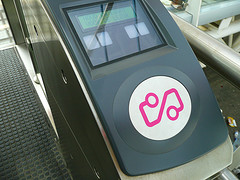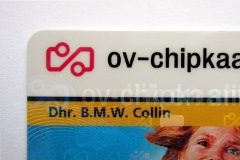 Dutch public transport companies have forced a new payment system onto their users, the ‘OV Chipkaart’ (‘Public transport chip card’), and are now complaining that travellers do not understand how the system works.
Dutch public transport companies have forced a new payment system onto their users, the ‘OV Chipkaart’ (‘Public transport chip card’), and are now complaining that travellers do not understand how the system works.
Rather than buying a ticket, you have to hold a chip on a card to a reader, once for checking in and once for checking out. Not surprisingly, a lot of people forget to check out, and in doing so lose the deposit that was subtracted from their digital wallet when they checked in. Until now most transport companies have refunded these lost deposits, but nu.nl reports that the refunds won’t be given forever.
Bus company Connexxion told the news site: “We look at this on a case by case basis. If you bump your head often enough, you’ll eventually learn not to.” Qbuzz, another bus company, estimates that it will keep giving money back for only a few more weeks.
Metro company RET of Rotterdam reports that people forget to check out about 0.5% of the time. Since the deposit is higher than the average amount of money the transport companies expect to make on a single fare and they do not have to do anything in return, that’s going to be a nice windfall for them.
The previous system (Strippenkaart) had a built in moneymaker like that too, in that you had to buy several tickets at once, which would undoubtedly get lost in one’s sofa to emerge only when the last date you could use the card on had gone by. Although it was possible to buy a ticket for just a single trip, these tended to be a lot more expensive.
The introduction of the OV Chipkaart also seems to have gone hand in hand with price hikes, Dutch News reports:
The government is to assess whether the switch to the new public transport smart card has made using buses and trams more expensive, Trouw [newspaper] reports on Tuesday.
There are have been numerous reports of price increases in recent months but the introduction of the OV Chipkaart had been coupled with a government pledge that travel would not become more expensive.
Uselog describes a host of usability problems with the OV Chipkaart.
(Photo by Franklin Heijnen, some rights reserved)
 Professor Dirk Smeesters of the Erasmus University resigned after a study uncovered ‘irregularities’ in two of his papers.
Professor Dirk Smeesters of the Erasmus University resigned after a study uncovered ‘irregularities’ in two of his papers.
 A while back
A while back  Dutch MPAA representatives Brein have broken the law by removing computer equipment worth hundreds of thousands of euro without a court order, law professor
Dutch MPAA representatives Brein have broken the law by removing computer equipment worth hundreds of thousands of euro without a court order, law professor 
 Dutch public transport companies have forced a new payment system onto their users, the ‘OV Chipkaart’ (‘Public transport chip card’), and are now complaining that travellers do not understand how the system works.
Dutch public transport companies have forced a new payment system onto their users, the ‘OV Chipkaart’ (‘Public transport chip card’), and are now complaining that travellers do not understand how the system works. 
 Singer/politician Henk Westbroek told daily De Pers (The Press) that
Singer/politician Henk Westbroek told daily De Pers (The Press) that